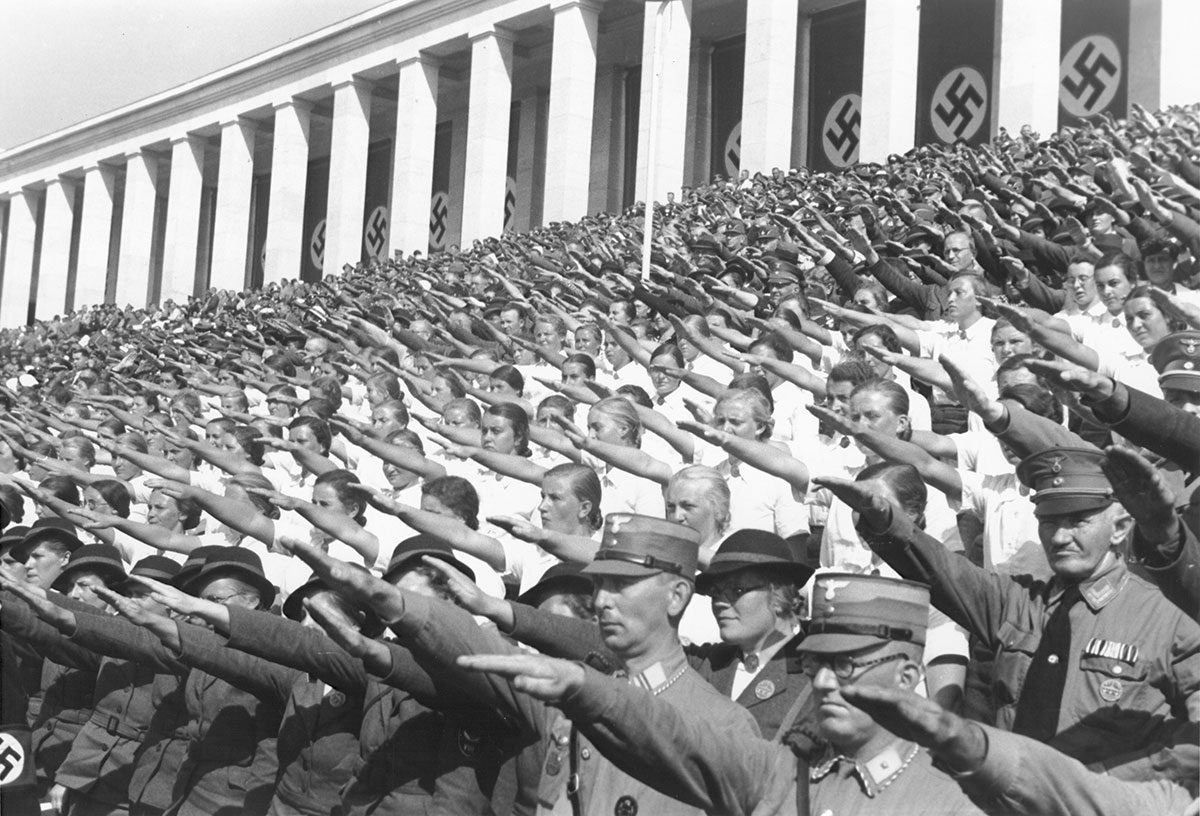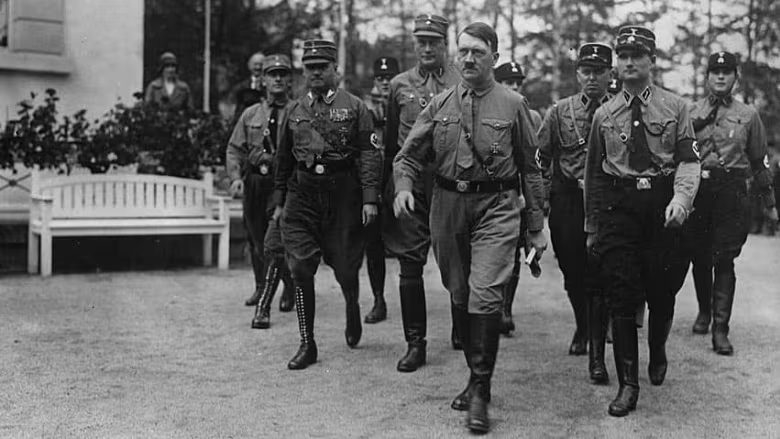Photo AI
Last Updated Sep 27, 2025
Essay Tips for the Rallies Simplified Revision Notes for Leaving Cert History
Revision notes with simplified explanations to understand Essay Tips for the Rallies quickly and effectively.
404+ students studying
Essay Tips for the Rallies
With this being a case study, it would be rude not to include some essay pointers to guide you in either your 40-mark contextualisation question or your 100-mark essay. Regardless of whether the rallies are a DBQ topic or a potential essay, these notes below should greatly aid your preparation.
Essay Preparation - How Successful Were the Nuremberg Rallies?
- The Nuremberg Rallies were highly effective as propaganda tools, attracting hundreds of thousands of participants and showcasing the Nazi Party's strength and unity. These mass gatherings created a sense of national pride and solidarity among attendees.
- The rallies were meticulously organised and featured elaborate staging, including grand architecture and dramatic lighting, which amplified their impact. The visual spectacle of these events left a lasting impression on both participants and observers.
- Adolf Hitler's speeches at the rallies were pivotal in disseminating Nazi ideology. His powerful oratory and charismatic presence helped to reinforce the regime's messages and galvanise support among the German population.
- The rallies were widely covered in Nazi-controlled media, including newsreels, radio broadcasts, and newspapers. This extensive media coverage ensured that the rallies' messages reached a broad audience, furthering their propaganda goals.
- The sense of community and belonging fostered at the rallies helped to consolidate the Nazi Party's base. Attendees felt part of a larger movement, strengthening their loyalty to Hitler and the party.
- The rallies also served as a platform for showcasing the Nazi regime's achievements and future plans. This public display of progress and ambition boosted confidence in the government's ability to restore Germany to greatness.
- The rallies successfully intimidated and marginalised opposition groups. The overwhelming display of Nazi power and unity discouraged dissent and reinforced the regime's dominance in German society.
- The international perception of the rallies varied, but they undeniably demonstrated the regime's organisational prowess and the extent of its popular support, enhancing Hitler's image on the world stage.

- The international perception of the rallies varied, but they undeniably demonstrated the regime's organisational prowess and the extent of its popular support, enhancing Hitler's image on the world stage.
Essay Preparation - What Did Goebbels and/or Riefenstahl Contribute to Nazi Propaganda?
- Joseph Goebbels, as Minister of Propaganda, played a crucial role in shaping and controlling the Nazi Party's messaging. He orchestrated extensive propaganda campaigns that permeated all aspects of German life, from media to arts and education.
- Goebbels utilised modern communication tools like radio, film, and print media to spread Nazi ideology. His mastery of these mediums ensured that Nazi propaganda was both widespread and effective, reaching millions of Germans.
- Goebbels was responsible for producing and promoting propaganda films that glorified the Nazi regime and demonised its enemies. Films like "The Eternal Jew" were instrumental in spreading anti-Semitic ideas and justifying the persecution of Jews.
- Leni Riefenstahl contributed significantly through her groundbreaking films, "Triumph of the Will" and "Olympia." These films used innovative techniques to create powerful visual narratives that celebrated Nazi achievements and ideals.
- Riefenstahl's "Triumph of the Will" documented the 1934 Nuremberg Rally, portraying it as a grand and unifying event. The film's use of dramatic angles, lighting, and editing made it a masterpiece of propaganda cinema.
- Goebbels and Riefenstahl's work helped to craft the image of Hitler as a charismatic and almost divine leader. Their propaganda efforts emphasised his supposed infallibility and the righteousness of the Nazi cause.
- Goebbels organised massive public events and rallies that were designed to inspire loyalty and devotion to the Nazi Party. These events, often captured by Riefenstahl's cameras, further solidified the party's image of strength and unity.
- Both Goebbels and Riefenstahl's contributions created a comprehensive and cohesive propaganda machine that effectively manipulated public perception, reinforced Nazi ideology, and suppressed opposition.
Essay Prep - How Successful Were the Rallies in Strengthening Hitler's Power in Germany?
-
The Nuremberg Rallies were instrumental in consolidating Hitler's power by creating an image of the Nazi Party as a unified and unstoppable force. The sheer scale and spectacle of the rallies reinforced the regime's dominance in German society.
- Hitler's speeches at the rallies were key in rallying support and promoting Nazi ideology. His charismatic delivery and persuasive rhetoric helped to solidify his position as the unquestioned leader of the German people.

- Hitler's speeches at the rallies were key in rallying support and promoting Nazi ideology. His charismatic delivery and persuasive rhetoric helped to solidify his position as the unquestioned leader of the German people.
-
The rallies served to intimidate and marginalise political opponents. The overwhelming display of Nazi strength and unity at these events discouraged dissent and demonstrated the futility of opposition.
-
The sense of community and collective purpose fostered at the rallies strengthened the loyalty of Nazi supporters. Attendees felt a personal connection to Hitler and the Nazi movement, enhancing their commitment to the cause.
-
The extensive media coverage of the rallies ensured that their impact extended far beyond those who attended in person. Films, radio broadcasts, and newspapers spread the messages and imagery of the rallies across Germany.
-
The rallies showcased the Nazi regime's organisational capabilities and achievements. By highlighting their successes and future plans, the rallies boosted public confidence in Hitler's leadership and the direction of the country.
-
The rallies helped to legitimise Hitler's authority by portraying him as the embodiment of the German nation and its aspirations. This carefully crafted image reinforced his absolute control over the Nazi Party and the state.
-
The international visibility of the rallies demonstrated the extent of Hitler's popular support, enhancing his standing on the world stage and deterring potential adversaries from challenging his regime.
500K+ Students Use These Powerful Tools to Master Essay Tips for the Rallies For their Leaving Cert Exams.
Enhance your understanding with flashcards, quizzes, and exams—designed to help you grasp key concepts, reinforce learning, and master any topic with confidence!
204 flashcards
Flashcards on Essay Tips for the Rallies
Revise key concepts with interactive flashcards.
Try History Flashcards26 quizzes
Quizzes on Essay Tips for the Rallies
Test your knowledge with fun and engaging quizzes.
Try History Quizzes29 questions
Exam questions on Essay Tips for the Rallies
Boost your confidence with real exam questions.
Try History Questions27 exams created
Exam Builder on Essay Tips for the Rallies
Create custom exams across topics for better practice!
Try History exam builder117 papers
Past Papers on Essay Tips for the Rallies
Practice past papers to reinforce exam experience.
Try History Past PapersOther Revision Notes related to Essay Tips for the Rallies you should explore
Discover More Revision Notes Related to Essay Tips for the Rallies to Deepen Your Understanding and Improve Your Mastery
96%
114 rated
Case Study: The Nuremberg Rallies
An Introduction to the Rallies
479+ studying
181KViews96%
114 rated
Case Study: The Nuremberg Rallies
The Rallies - Location, Theme and Role in Propaganda
258+ studying
182KViews96%
114 rated
Case Study: The Nuremberg Rallies
Nuremberg Laws and the Rallies as a ‘Religious Experience’
469+ studying
197KViews96%
114 rated
Case Study: The Nuremberg Rallies
Essay Tips for the Rallies
465+ studying
198KViews